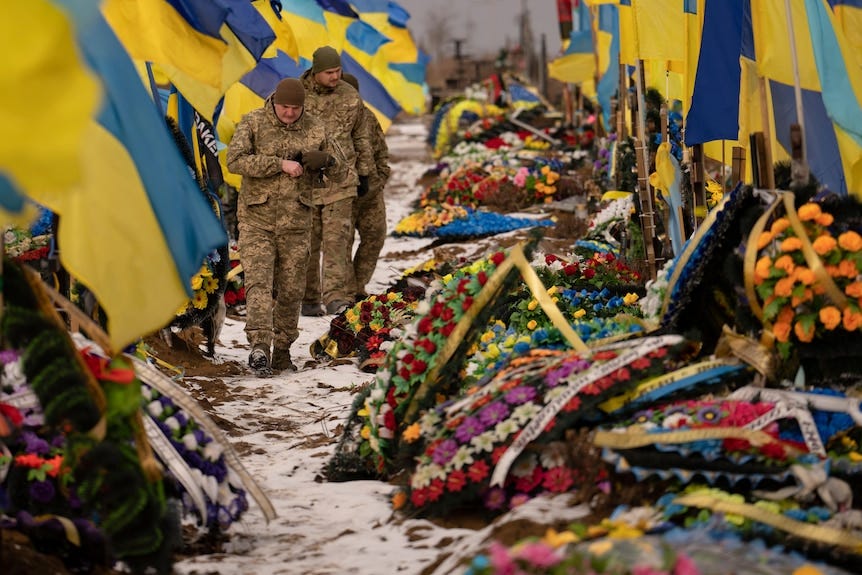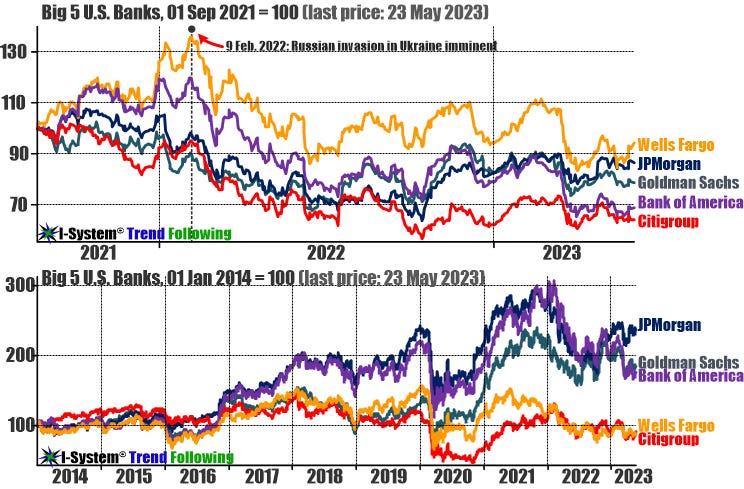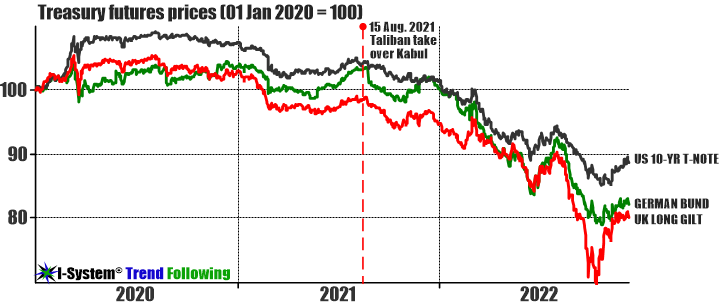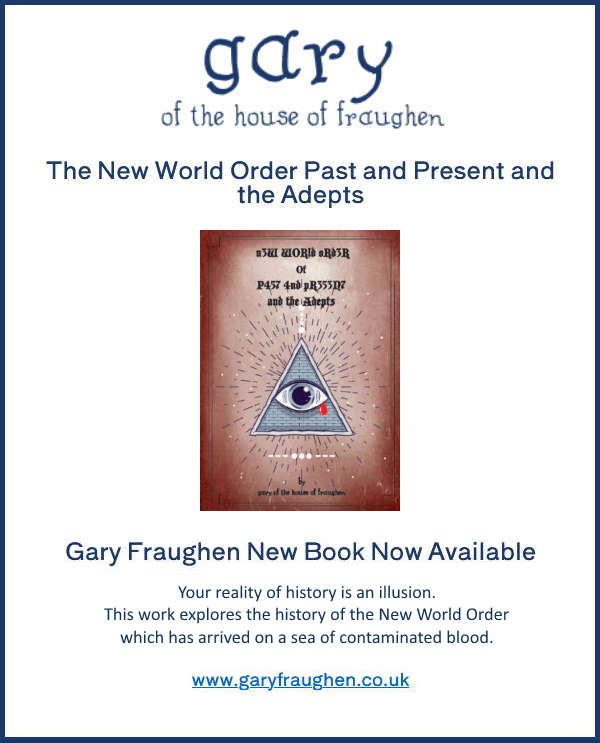Will Ukraine sink Citigroup? Alex Krainer
Sat 10:56 am +00:00, 27 May 2023 2One group ties together Joe Biden, Obama Administration and the west’s great misadventure in Ukraine.
Earlier this week I was invited to attend a lecture about the conflict in Ukraine by Prof. John Mearsheimer in Washington D.C. The introducer began with the question: what is the difference between American Republic and American Empire, and offered John Quincy Adams‘ answer: the Republic represents the march of the mind, while the Empire represents the march of the soldier. The Republic embraces neutrality while the Empire embraces manifest destiny. The Republic cultivates separation of powers while the Empire cultivates limitless power of the executive…
Professor Mearshimer took the stage to present a rather condensed view of the conflict in Ukraine and his own judgment that Russia will win and that Ukraine would lose: the outcome that’s all but inevitable and hard to argue with. The conflict is a war of attrition with both sides trying to bleed the other white. In this type of war, the outcome depends on three key factors:
1. strength of resolve
2. population size
3. balance of artillery power
In terms of the strength of each side’s resolve, they are quite balanced: both view the conflict as existential. However, Russia has a large advantage in terms of population size and in terms of artillery power. Very conservatively, when the war started, Russian population was about 3.5 times that of Ukraine. But at least 8 million people have fled Ukraine since the beginning of the war and today Russia’s advantage is 5 to 1. In fact, it could be larger than that. It is estimated that Ukraine’s population today numbers between 14 and 18 million people, so Prof. Mearsheimer’s figures could be too conservative. In terms of artillery power, the balance is also grossly in Russia’s favor by a factor of 5, 7, or even 10 to 1.
No, Ukraine is not winning the war. It’s losing.

The narratives about the Ukrainian forces killing 7 Russian soldiers for every Ukrainian casualty are simply untrue. They’re almost certainly the exact opposite, which is in itself remarkable: the rule of thumb in warfare is that to prevail, the attacking side must have three times the force of the defending side and should expect to incur three times the casualties. Prof. Mearshimer also dispelled another distortion that’s been a constant theme in western media: that the Russian military is bungling the conflict, suffers low morale and is performing poorly.
He said that the Russians have become very sophisticated in their conduct of the war, using various means to locate Ukrainian key assets and troops and then destroying them under an intense barrage of missiles and accurate artillery fire. As a result, Ukraine’s position is growing increasingly desperate. Their best units have been annihilated and by now they’re pulling people off the street, including old men and very young boys, forcing them into the fight with very little training. In this, Mearsheimer’s presentation wasn’t very different from views shared by other experts like LTC Douglas MacGregor, Scott Ritter, Larry Johnson and Ray McGovern.
The dirty, dirty hand of Joe Biden
But perhaps the most interesting part of his presentation was when, during the Q&A session he mentioned the dirty hand that Joe Biden has played in the conflict: during the Obama Administration, when the Euromaidan coup was orchestrated (Feb. 2014), Joe Biden was in charge of the Ukraine portfolio and he was a “superhawk” in that role. Mearsheimer did not elaborate much on this point, but he did note that Ukraine’s president Zelensky turned much more aggressive toward Russia and Ukraine’s breakaway regions practically from the day Joe Biden entered the White House. Recall,Zelensky was elected in 2019 by a 70% majority of Ukrainian people in the west and in the east of the country because he promised to make making peace with Russia and to respect the rights of ethnic Russians.
Most observers will recall Biden’s performance at the Council of Foreign Relationswhere he boasted about forcing President Petro Poroshenko to fire Ukraine’s public prosecutor Viktor Shokin by threatening to withhold $1 billion in U.S. aid to his government. But Biden’s role was much more extensive than that. On the day of the Euromaidan Coup in February 2014, the same day when President Barack Obama was discussing with Vladimir Putin how to diffuse the crisis, Biden called President Viktor Yanukovich and pressured him to withdraw his security forces from Kiev and from all the government buildings. Yanukovich, who had just signed a deal with opposition, conceding to all of their demands, walked straight into Biden’s perfidious trap and within hours of ordering his security forces to withdraw, armed neo-Nazi groups stormed the government buildigns, presidential palace and Yanukovich’s private residence. Yanukovich had to flee the country to save his life.
Along with Sweden’s Foreign Minister Carl Bildt, Biden also played the key role in coercing the Kiev Junta to launch its brutal “anti-terorist operation” in April 2014 which resulted in massacres of hundreds of civilians in Odessa, Mariupol, Slaviansk, Kramatorsk and other towns across Ukraine’s southern and eastern districts. The regime was urged by its western handlers to consolidate control of these regions as they accounted for the bulk of Ukraine’s economic output.
Barely ten days after the massacre of the regime’s opponents – all unarmed civilians – Joe Biden’s son Hunter was nominated as a director of Burisma, Ukraine’s energy giant that was owned by one of the planners of the Odessa massacre, oligarch Ihor Kolomoyskiy who ordered his private Dniepr-1 Battalion to help carry it out. Indeed, the corruption moneys earned in Ukraine by the Biden family was literally drenched in the blood of innocents.
So, where’s Citigroup in all this?
The pressure to consolidate control over south and east of Ukraine originated from the banking circles. On Thursday, May 1, 2014, just one day before the massacres in Kharkov, Slavyansk and Odessa, CNBC ran the headline: “IMF warns Ukraine on bailout if it loses east.” The article reported that, “‘This is something of a leap of faith for the IMF and is politically driven by key IMF shareholders to support the [Junta prime minister Arseniy] Yatsenyuk ‘kamikaze’ administration in its reform efforts…’”
IMF’s shareholders consist of the American and European financial oligarchy, the same club that controls Citigroup and other global systematically important banks (GSIBs). However, Citigroup may have had the greatest appetite for a piece of Ukrainian action which began with the 2014 Euromaidan coup, planned and organized by a cabal of western officials including a group of Neocons within the Obama administration. There’s some evidence suggesting that Obama himself wasn’t in the loop, but was dragged along with the project by a group of conspirators consisting of individuals like John Kerry, Joe Biden, Hillary Clinton, John McCain and Victoria Nuland.
Citigroup shapes the Obama cabinet
Citigroup was among the top donors to Obama’s presidential campaign. As we learned from the shocking Wikileaks revelations in October 2016, the bank also had a large role in staffing Obama’s 2008 Transition Team, his cabinet and the associated “Agency Review” teams. This was evidenced in the 2008 communications between the bank’s executive and former Bill Clinton administration official Robert Froman, Robert Rubin, Lawrence Summers, John Podesta, Jack Lew and another handful of individuals. Fromann would become Obama’s Trade Representative.
Citigroup’s Chief Operating Officer, Jack Lew would become Obama’s Secretary of the Treasury. In that capacity he coordinated the Administration’s policy on Ukraine with the Kiev Junta’s Prime Minister and the head of the IMF, Christine Lagarde: “Secretary Lew informed Managing Director Lagarde that he had spoken earlier in the day with Ukrainian leader Arseniy Yatsenyuk and advised him of the broad support for an international assistance package centered on the IMF, as soon as the transitional Ukrainian government is fully established by the Parliament.”
On February 27, 2014, within five days after Ukraine’s President Viktor Yanukovich was toppled, the rump Parliament approved the new regime and the IMF funds could begin to flow. “Secretary Lew also noted that he had communicated to Mr. Yatsenyuk the need to quickly begin implementing economic reforms and enter discussions with the IMF following the establishment of the transitional government.”
We can’t be sure whether Joe Biden was one of the officials empowered by Citigroup, but it is curious that a man who had built up a reputation for having no integrity and an almost total lack of any scruples and principles would be chosen as the running mate in Obama’s transformational hope-and-change presidency.
The lady doth protest too much, methinks.
Suspicions about the extent of Citigroup’s role in Ukraine were further underscored last month at the U.S. – Ukraine Partnership Forum when Citi’s Global Head of Public Sector Banking Julie Monaco spoke that, “we must win this war…” It was indeed Ms. Monaco’s nervous performance that made me wonder why a U.S. public sector banker should be as keen on winning an Eastern European war in which the U.S. is not even a participant? There may be a lot to know about all this but only high-level insiders may know the full story. In the meantime, perhaps Citigroup’s share price could offer some clues?
Citigroup: dead last among the U.S big five banks
As it turns out, out of the US big five banks, Citigroup has been the worst performer since 2014 (the events leading to the coup that year began in September 2013) and also since Q4 2021 when the conflict between Ukraine and Russia began to escalate to the full hot war that is still raging. There’s nothing conclusive in these charts, but they do look very intriguing:

Citigroup has been the worst performer over both time frames shown in the above charts. Furthermore, we can see that bank stocks have all sagged since the beginning of Russia’s intervention in Ukraine, peaking only days before it started, when it was already clear that this intervention was very likely. Are these developments related? It is difficult to say, but we shouldn’t dismiss the possibility.
The mystery of the wisdom of crowds
We’ll take a small digression, which is worth it for the sheer fascination factor of it: the markets – more broadly, the human collective – appears to have a mysterious ability to converge on the truth of relevant situations. This ability might be impossible to explain but it has been documented in many different ways, including in the financial markets. I condensed one such story from James Surowiecki‘s book, “The Wisdom of Crowds.” Below is the full excerpt from my 2021 book, “Alex Krainer’s Trend Following Bible” (p. 94/95):
In efficient markets, the participants’ collective knowledge of all the factors relevant to some security will tend to set the price roughly at the correct level. Again, this is a belief, not something we know for sure or even understand with much clarity. Exactly how price may discount everything is also a rather mysterious phenomenon. In his fascinating book “The Wisdom of Crowds,” James Surowiecki recounts one illuminating instance of the price discovery process at work.
On 28 January 1986, 73 seconds into its flight, the space shuttle Challenger exploded over the Atlantic Ocean off the coast of central Florida. This tragic event triggered a revealing reaction in the stock market. In large part, Challenger’s launch was the work of four major NASA contractors: Rockwell International, Lockheed, Marin Marietta and Morton Thiokol. Each of them was a publicly traded company. On the day of the Challenger disaster, the stock price of each contractor started dropping some 30 minutes after the explosion, before most people even had the time to digest what had happened.
One firm was hit harder than others: within an hour of the explosion, Morton Thiokol’s stock was down 6% and its trading had to be halted. After trading resumed, its stock continued falling and by the end of the day, it was down 12%. By contrast, the stock of other three contractors rebounded and closed with a loss of only about 3% for the day. The reasons why the stock market singled out Morton Thiokol weren’t clear; on the day of the disaster, there were no public comments declaring that Morton Thiokol might be responsible for the incident.
On the following day, rumors about what had happened published in the papers did not implicate Thiokol either. In fact, it was fully six months after the explosion that investigators concluded that the Challenger blew up due to the O-ring seals on booster rockets that were built by Morton Thiokol, and that the other three contractors were not liable.
Can it be that within 30 minutes of the incident the stock market determined what took investigators months to ascertain? I must confess that I found this account hard to believe and as I read it, my immediate thoughts were that Morton Thiokol insiders must have dumped their shares in a thin volume session and as the price started dropping, some other participants may have followed suit and that’s how the stock ended up battered. However, an analysis of the episode by finance professors Michael T. Maloney and J. Harold Mulherin cited by Surowiecki found that insiders did not sell their stock on that day. In fact, Maloney and Mulherin were entirely unable to come up with a convincing explanation for why Morton Thiokol stock was so quickly singled out by the stock market. It may well be that the market, in its mysterious collective wisdom somehow knew the relevant truths and set the price accordingly.
Surowiecki’s book compellingly supports this possibility. Of course, as fascinating as it is to ponder the omniscience of collective wisdom, we must also acknowledge that markets periodically manifest manias or panics offering a very different perspective on their wisdom. But as Surowiecki argues, the ability of the collective to reach intelligent solutions to problems depends on certain conditions like decentralization of the flow of information, diversity of the participants, and their independence from one another in making decisions. If either of these conditions is compromised, the wisdom of crowds can – and periodically does – morph into a madness.
All in itself, the wisdom of crowds is a profoundly fascinating concept that’s manifested itself in myriads of ways and it is of utmost relevance to trend following as an investment strategy, which is based on the belief that an asset’s price reflects all the information relevant to that asset. Whatever the case might be, it will be interesting to see how the share prices of different western banks will evolve over the coming months as Russia gains the upper hand in dictating the terms of peace. This whole conflict is ultimately an economic affair, a scramble by western interests to control the labor and natural resources collateral of the Eurasian landmass.
In a Substack post earlier this month, I proposed that this phenomenon was at work in shaping the markets’ reaction to the empire’s loss of Afghanistan in August 2021 (see, “Why the loss of Afghanistan will ultimately end the empire”). Again, here’s that chart:

All wars are bankers’ wars!
Collateral is the essential ingredient powering the creation of credit by western financial institutions, primarily the GSIB’s (Global Systemically Important Banks). They stand the most to gain if western powers prevail, and the most to lose if they’re defeated. Ukraine is the key piece of the Eurasian puzzle and it is certain that western banks have very substantial exposure there – only we don’t know which ones or how extensively. Adverse developments in Ukraine could push the sector back into a bear market and the banks that are overexposed to Ukraine could exacerbate the financial crisis, force central banks to more bank bailouts with open-ended QE, and reignite another cycle of high inflation.
https://alexkrainer.substack.com/p/will-ukraine-sink-citigroup?utm_source=substack&utm_medium=email














As Mrs Rothschild said, standing washing dishes in her pinny and slippers before Corrie comes on’t tele, “If ma lads didn’t want wars, there’d be nee wars, nowt ataw”. Or words to that effect.
Ha ha! Very true too
A good article by Krainer which is very believable and which paints the opposite picture to the MSM
Hmmm, that’s the way these things roll nowadays isn’t it. If the MSM says one thing then, if you consider the opposite of what they say then, you are very likely nearer the truth. What a crazy world we live in, particularly here in the Empire of Lies